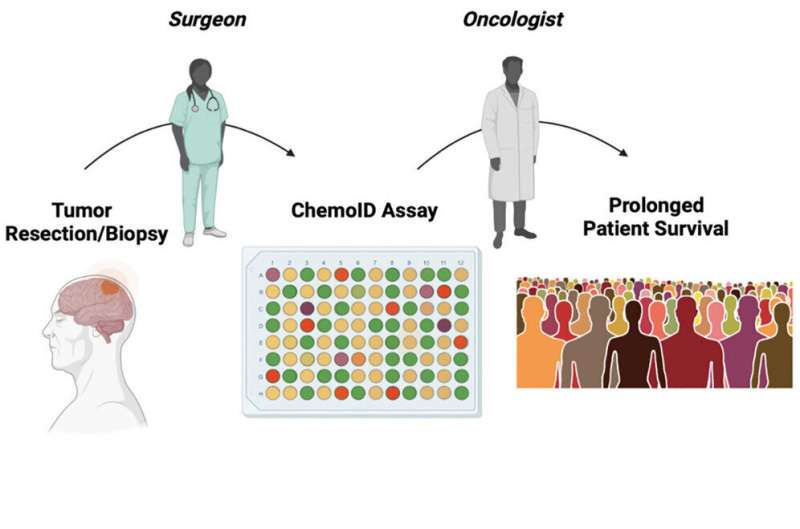This article has been reviewed according to Science X's editorial process and policies. Editors have highlighted the following attributes while ensuring the content's credibility:
fact-checked
peer-reviewed publication
trusted source
proofread
Study: ChemoID platform-predicted treatments lead to longer survival for glioblastoma patients

New multi-institutional phase 3 clinical trial data published May 2 in Cell Reports Medicine found that a cancer stem cell test can accurately decide more effective treatments and lead to increased survival for patients with glioblastoma, a deadly brain tumor.
The University of Cincinnati's Soma Sengupta, MD, Ph.D., a co-first author of the research and a University of Cincinnati Cancer Center physician-researcher, said the research focused on patients whose glioblastoma had returned after initial treatment.
The trial tested the effectiveness of a platform called ChemoID, a CLIA and CAP-accredited diagnostic test, developed by Dr. Pier Paolo Claudio and Dr. Jagan Valluri of Cordgenics LLC.
"ChemoID looks at cancer stem cells and their sensitivity to specified drugs to see which ones will work in a given cancer setting," said Sengupta, UC associate professor in neurology, director of neuro-oncology clinical trials, associate director of the Brain Tumor Center and a UC Health neuro-oncologist.
Patients in the trial were randomized to have the choice of chemotherapy treatment decided through ChemoID or to have physicians choose the chemotherapy using standard methods. Sengupta noted oncologists choosing treatments are often dictated by guidelines and insurance considerations.
Those who had their treatments selected through ChemoID had a significantly lower risk of death and, on average, survived 3.5 months longer than those in the physician-choice group.
"We were pleasantly surprised that the ChemoID group did better and that a cancer stem cell-derived test is important in this disease," Sengupta said. "Where survival in recurrent glioblastoma is extremely poor, 3.5 months or more is wonderful. Some of my patients on this trial are still alive."
Claudio explained that because ChemoID focuses on choosing treatments using commercially available chemotherapies, this approach offers a way for patients to receive more effective treatment at a lower cost.
According to Valluri, if the anti-cancer therapy that targets cancer stem cells is incorporated earlier in the treatment plan, ineffective treatments will be eliminated, and patients will be able to receive the maximum therapeutic benefit.
"This is an example of a highly collaborative project," Sengupta said. "At UC alone, several colleagues, including Dr. Mario Zuccarello and Dr. Rekha Chaudhary, were involved."
More information: Tulika Ranjan et al, Cancer stem cell assay-guided chemotherapy improves survival of patients with recurrent glioblastoma in a randomized trial, Cell Reports Medicine (2023). DOI: 10.1016/j.xcrm.2023.101025



















